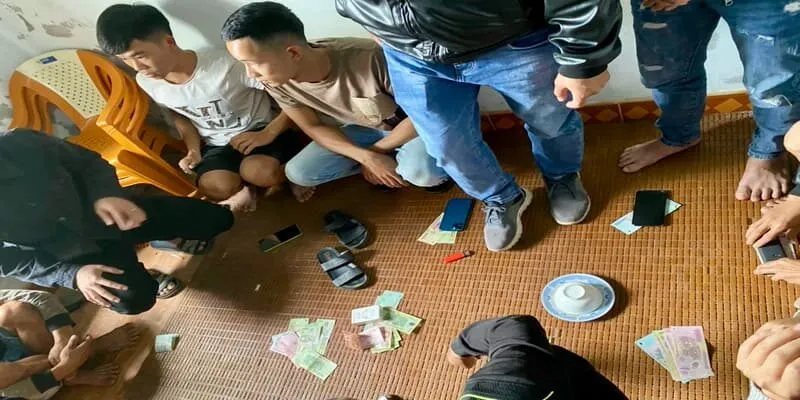Xóc Đĩa Online – Cập Nhật Nhà Cái Hàng Đầu 2025
GO88
HIT CLUB
B52CLUB
789 Club
MANCLUB
MAYCLUB
NHATVIP
IWIN
RIKVIP
SUNWIN
8LIVE
FIVE88
DEBET
SIN88
ZBET
✩ Đăng ký tặng quà hấp dẫn
ZO88
✩ Đăng ký tặng quà hấp dẫn
FO88
✩ Đăng ký tặng quà hấp dẫn
86BET
✩ Đăng ký tặng quà hấp dẫn
VIVU88
✩ Đăng ký tặng quà hấp dẫn
ZOWIN
✩ Đăng ký tặng quà hấp dẫn
YO88
✩ Đăng ký tặng quà hấp dẫn
DOM88
✩ Đăng ký tặng quà hấp dẫn
| Nhà Cái | Lý Do Nên Tham Gia | Ưu Đãi Đặc Biệt |
| Rubik88 | – Số lượng người chơi đông đảo
– Hệ thống chăm sóc khách hàng chuyên nghiệp – Tỷ lệ cược xóc đĩa cao – Nhiều chương trình khuyến mãi |
Hoàn trả 1% không giới hạn |
| Fun88 | – Giao diện thân thiện, dễ sử dụng
– Hỗ trợ người chơi 24/7 – Tỷ lệ trả thưởng cao, hấp dẫn |
Tặng thưởng VIP tới 24.888.888 VND |
| M88 | – Được cấp phép hoạt động hợp pháp
– Nhiều trò chơi phong phú, đa dạng – Hỗ trợ khách hàng 24/7 – Khuyến mãi khủng thường xuyên |
100% thưởng đăng ký mới |
| W88 | – Hoạt động lâu đời tại Việt Nam
– Hàng nghìn trò chơi xóc đĩa online hấp dẫn – Hỗ trợ nạp và rút tiền nhanh chóng – Ưu đãi đặc biệt cho người chơi mới |
Nhận 38 vòng quay miễn phí |
| FB88 | – Bảo mật thông tin khách hàng tuyệt đối
– Khuyến mãi liên tục, hấp dẫn – Hỗ trợ đa nền tảng, bao gồm PC và Mobile |
Bốc thăm trúng iPhone 15 cho người nạp tiền |
| JBO | – Chuyên về cá cược esports và thể thao
– Giao diện hiện đại, dễ sử dụng trên mọi thiết bị – Nhiều chương trình khuyến mãi lớn |
Tặng thưởng 200% cho người chơi mới |
| 188bet | – Nhà cái uy tín với hàng triệu người chơi
– Thanh toán nhanh chóng và minh bạch – Khuyến mãi khủng |
Tặng 300 triệu đồng cho lần nạp đầu |
Top nhà cái xóc đĩa online uy tín 2025
Trên thị trường hiện nay có rất nhiều nhà cái xóc đĩa online uy tín dành cho các cược thủ lựa chọn. Hãy theo dõi để biết mình nên lựa chọn sân chơi nào để bắt đầu cá cược ngay nhé:
Xóc đĩa online GO88
Xóc đĩa online Go88 được xem là một trong các lựa chọn hàng đầu trên thị trường hiện nay. Nếu bạn đang tìm kiếm sân chơi cá cược cho mình, chắc chắn không thể bỏ qua đơn vị này.
- Lợi thế: Theo đó, Go88 cập nhật sảnh xóc đĩa với nhiều mức cược khác nhau. Bàn game cá cược cũng được thiết kế một cách sinh động và hấp dẫn với hình ảnh thực tế. Đồng thời, các Dealer cũng “làm chủ” những màn cược thông minh, giúp cho người chơi cảm thấy thoải mái nhất khi dự đoán game xóc đĩa.
- Nhược điểm: Bên cạnh các ưu điểm được kể đến phía trên, xóc đĩa Go88 cũng có một vài nhược điểm. Điển hình đó là khi chơi game trong thời gian cao điểm, tốc độ chạy sẽ chậm hơn so với thông thường. Đây là vấn đề mà hầu như sân chơi trực tuyến nào hiện nay cũng mắc phải.

Xóc đĩa trực tuyến uy tín Sunwin
Sunwin cũng là một trong những cổng game xóc đĩa online dành cho mọi tay chơi. Sân chơi này vốn dĩ đã quen thuộc với những game đổi thưởng giá trị, đặc biệt là với tỷ lệ nhận thưởng lớn.
- Lợi Thế: Khi truy cập Sunwin thành công, người chơi dễ dàng bắt đầu chơi xóc đĩa online dễ dàng với mức cược thấp nhất. Hệ thống có bảng hướng dẫn chi tiết và rõ ràng để các thành viên theo dõi dễ dàng hơn, đảm bảo không gặp khó khăn trong quá trình cá cược.
- Nhược điểm: Có khá ít bàn xóc đĩa hiện đang được hỗ trợ cho các thành viên tham gia. Do đó, cược thủ cần hết sức cân nhắc trong quá trình chơi game, từ đó có trải nghiệm trọn vẹn và nhận giá trị phần thưởng lớn nhất.
Xóc đĩa đổi thưởng online Hitclub
Trong top các cổng game xóc đĩa online được đánh giá cao nhất 2025, Hitclub là “cái tên” tương đối nổi bật với nhiều ưu điểm khác nhau. Đây là sân chơi đã nhận được giấy phép hoạt động nên mọi dịch vụ được đảm bảo an toàn nhất.
- Lợi Thế: Với người chơi xóc đĩa đổi thưởng ở Hitclub, bạn sẽ thấy ưu điểm nổi bật của sân chơi này là luôn cập nhật những bàn game giá trị cao nhất. Đối với tay chơi lâu năm, khi đầu tư hợp lý thì đây chính là cơ hội kiếm tiền cực đã. Ngoài ra, tốc độ giao dịch nhanh chóng cũng được xem là điểm mạnh của sân chơi.
- Nhược điểm: Về giao diện chơi xóc đĩa, Hitclub vẫn chưa có sự đầu tư quá chỉn chu. Theo đó, màn hình chơi game vẫn còn khá đơn giản và thiếu các tính năng hỗ trợ cơ bản nên đôi lúc tay chơi mới sẽ cần nhiều thời gian hơn cho những tương tác của mình.

Game xóc đĩa B52
B52 cũng khá nổi tiếng trên thị trường chơi game trực tuyến hiện nay, đặc biệt là khi nói về chủ đề “xóc đĩa”. Cổng game online luôn cam kết mang lại cho người chơi các màn game giá trị thực hấp dẫn nhất.
- Lợi Thế: Khi chơi xóc đĩa đổi thưởng online ở B52, kể cả thành viên mới cũng có cơ hội nhận thưởng từ chiến thắng của mình. Đồng thời, cổng game cũng liên tục cập nhật các loại mã code khác nhau để người chơi áp dụng hiệu quả. Do đó, bạn không chỉ nhận thưởng từ bàn xóc đĩa đang tham gia mà còn nhiều phần thưởng khác.
- Nhược điểm: Còn đối với hạn chế khi tham gia tại B52, số lượng trong một bàn game sẽ bị hạn chế. Do đó vào giờ cao điểm các tay chơi sẽ khó tìm được lựa chọn ưng ý nhất cho mình để bắt đầu cá cược.
Xóc đĩa đổi thưởng Gemwin
Một trong các thương hiệu nằm top game xóc đĩa hot nhất trên thị trường hiện nay không thể bỏ qua Gemwin. Thương hiệu cá cược trực tuyến đã được công nhận uy tín và chất lượng top 1 nên bất cứ ai khi truy cập cũng không cần lo lắng.
- Lợi Thế: Về ưu điểm của Gemwin, các thành viên khi truy cập sẽ được hỗ trợ tận tình từ đội ngũ CSKH chuyên nghiệp nhất. Ngoài ra, mỗi bàn xóc đĩa online đều có sự xuất hiện của Dealer xinh đẹp và nóng bỏng, điều này khiến cho trải nghiệm chơi game trở nên hấp dẫn và thu hút hơn.
- Nhược điểm: Nói về hạn chế của những bàn game xóc đĩa Gemwin, đôi lúc sẽ xảy ra lỗi hệ thống do số lượng người chơi quá đông. Tuy nhiên, tình trạng này hiện đang được khắc phục nên thành viên không cần quá lo lắng.

Cổng xóc đĩa 789club
Cổng game xóc đĩa 789club khá phổ biến trên thị trường hiện nay, đây là lựa chọn được ưa chuộng nhất bởi những tay chơi chuyên nghiệp. Tại đây, bạn có cơ hội được trải nghiệm các màn cược giá trị và hấp dẫn đặc biệt, xem thêm:
- Lợi Thế: 789club vốn dĩ là một thương hiệu cá cược lâu năm, đã có vị thế khá vững chắc trên thị trường. Do đó các dịch vụ chơi game hay giao dịch đều đảm bảo được tính an toàn tuyệt đối. Giá trị các bàn game xóc đĩa cũng được đánh giá cao với sự đa dạng, phù hợp với nhiều đối tượng khi tham gia.
- Nhược điểm: Về nhược điểm của cổng game này, vì số lượng người truy cập trong ngày tương đối lớn. Do đó, việc kiểm soát toàn bộ yêu cầu và tin nhắn của người chơi gửi về hộp thư thoại hệ thống còn khá chậm, chưa thể khiến cho toàn bộ khách hàng hài lòng. Để khắc phục, tay chơi nên tránh liên hệ vào giờ cao điểm để được xử lý nhanh chóng hơn.
Chơi xóc đĩa Rikvip
Rikvip luôn mang đến cho người truy cập một trải nghiệm hấp dẫn đỉnh cao, đặc biệt là ở “bộ môn” xóc đĩa. Có đa dạng bàn cược với giá trị khác nhau từ thấp đến cao, bất kể bạn là tay chơi mới hay là người chơi lâu năm cũng đều truy cập và trải nghiệm một cách dễ dàng:
- Lợi Thế: Tỷ lệ trả thưởng và hoàn trả cược thua của Rikvip gần như cao nhất trên thị trường hiện nay. Vì vậy khi tham gia chơi xóc đĩa, dù không có chiến thắng quá lớn thì thành viên cũng có thể nhận được khoản tiền thưởng từ phần hoàn trả này của hệ thống. Ngoài ra, việc chơi game diễn ra trọn vẹn hơn với giao diện thiết kế đẳng cấp hàng đầu.
- Nhược điểm: Vì tỷ lệ hoàn trả cao cùng với nhiều ưu đãi khác nhau được cập nhật cho người chơi. Thế nên giá trị các bàn cược cũng sẽ “nhỉnh” hơn so với các thương hiệu còn lại trên thị trường.

Web Xóc Đĩa Iwinclub
Các trang web xóc đĩa cũng dần phát triển và phổ biến hơn bao giờ hết, được đông đảo tay chơi mới lẫn người chơi lâu năm tìm kiếm và lựa chọn. Theo đó, việc truy cập website chơi game khá dễ dàng và thao tác trên màn hình cũng đơn giản hơn cho thành viên, giúp việc cá cược diễn ra hiệu quả hơn bao giờ hết. Ngoài ra:
- Lợi Thế: Ưu thế lớn nhất của web xóc đĩa trực tuyến Iwinclub chắc chắn là tính an toàn và bảo mật tuyệt đối, người chơi yên tâm 100% trong quá trình cá cược. Theo đó, thương hiệu trực tuyến đã nhận được giấy phép hoạt động từ tổ chức uy tín, đồng thời được quản lý bởi Chính phủ nước sở tại nên mọi giao dịch được cam kết an toàn nhất.
- Nhược điểm: Có không nhiều nhược điểm gây ảnh hưởng đến trải nghiệm của người chơi tại đây. Điều này là bởi hệ thống luôn tiếp nhận đánh giá và phản hồi từ khách hàng để cải tiến trải nghiệm sao cho chất lượng nhất. Tuy nhiên, thời gian bảo trì hệ thống thường khá lâu nên cần phải chờ đợi để có thể tiếp tục trải nghiệm.
Cổng game Xóc Đĩa Online Win79
Win79 cũng nằm trong top các cổng game xóc đĩa đổi thưởng online hot nhất năm 2025 mà bất cứ tay chơi nào cũng nên trải nghiệm. Cách đăng ký thành viên tại đây tương đối dễ dàng, chỉ cần 3 bước là đã có thể hoàn thành, không gây tốn thời gian người dùng. Bên cạnh đó, bạn còn có thể tham khảo một vài ưu và nhược điểm của cổng game dưới đây:
- Lợi Thế: Về mặt ưu điểm, Win79 sở hữu đa dạng thể loại xóc đĩa khác nhau với giá trị cược hấp dẫn để các tay chơi lựa chọn. Mỗi bàn chơi đều có sự xuất hiện của những cô nàng Dealer xinh đẹp và quyến rũ nhất. Điều này giúp cho việc chơi game diễn ra trọn vẹn hơn bao giờ hết.
- Nhược điểm: Bởi có khá nhiều ưu điểm nên lượng khách hàng tại đây vô cùng lớn, hơn 1 triệu lượt truy cập mỗi ngày. Vì vậy trong một vài thời điểm, người chơi giao dịch tương đối khó khăn bởi hệ thống cần xử lý nhiều lệnh nạp – rút cùng lúc.

Cổng trò chơi Xóc Đĩa Manclub
Còn đối với Manclub, việc thu hút các tay chơi mới được xem là điều quá “thường tình” đối với một thương hiệu uy tín. Cổng game xóc đĩa online uy tín luôn cập nhật xu hướng mới mỗi ngày để các thành viên không cảm thấy nhàm chán khi chơi. Cụ thể:
- Lợi Thế: Khuyến mãi dành cho người chơi tại các bàn game vô cùng giá trị nên chắc chắn không khiến bạn thất vọng. Đồng thời nếu bạn dự đoán đúng ở nhiều lượt chơi và giành được “chuỗi chiến thắng” ở các cấp độ theo quy định. Khi đó sẽ nhận thêm số tiền thưởng khủng từ hệ thống.
- Nhược điểm: Để tránh việc phải chờ đợi quá lâu trong quá trình giao dịch, hãy nạp tiền từ sớm cùng 1 khoản để chơi thoải mái hơn. Ngoài ra, nếu bạn là tay chơi mới thì vẫn nên cân nhắc khi đầu tư cho màn cược tại đây, còn nếu đã chơi lâu năm, đừng ngần ngại mà hãy cược lớn ngay.
Lời kết
Game xóc đĩa trực tuyến luôn là lựa chọn lý tưởng nhất cho những người chơi hiện nay. Hy vọng bài viết trên đây chia sẻ về ưu và nhược điểm của các thương hiệu chơi game hàng đầu đã giúp ích cho bạn trong việc tìm kiếm sân chơi cá cược yêu thích cho mình.






























